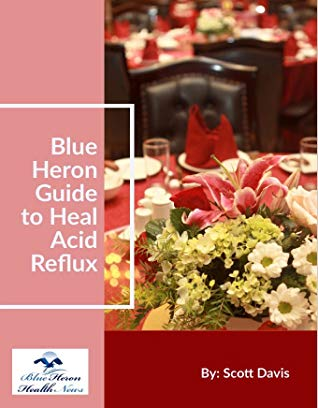4 Acid Reflux Treatments That Work: Complete Guide 2024
By Vanessa Richards
January 10, 2024 • Fact checked by Dumb Little Man

Heartburn is a relatively common inconvenience that affects most people at some point in their lives. It usually occurs after a particularly spicy meal or one too many shots of alcohol.
It is caused by the acidic contents of your stomach entering back into the esophagus, called acid reflux. This leads to pain and irritation at the lower esophagus and other symptoms.
Even though this occurs infrequently in most people, some people have to deal with frequent attacks of acid reflux. This condition is known as gastroesophageal reflux disease (GERD).
Let’s take a look at the symptoms, causes, and treatment options of acid reflux and GERD.
Acid Reflux Treatment: What Is Acid Reflux?

Acid reflux is a relatively common condition that affects the digestive system. It occurs when the acidic contents of the stomach travel back up into the esophagus, leading to irritation, pain, and a host of other features. When these attacks occur frequently, the condition is called gastroesophageal reflux disease.
Usually, when food passes through your esophagus and into your stomach, there is no backward movement. This is because of a special structure at the junction of the esophagus and stomach called the lower esophageal sphincter. This sphincter functions just like a one-way valve that closes when food enters the stomach.
Sometimes, the sphincter might not close properly for a variety of reasons and the content from the stomach, including stomach acid, can go back to the esophagus. Acid reflux causes a wide range of symptoms and complications, ranging from relatively minor to potentially life-threatening.
Symptoms of Acid Reflux

The following are some common acid reflux symptoms.
Heartburn
Heartburn is a burning pain that commonly occurs in the chest, though it can also be felt in the throat or upper abdomen. It is the most common feature of acid reflux. Sometimes it can be triggered by lying down immediately after eating, wearing tight clothing, eating certain foods, or even as a side effect of certain medications.
Bitter Taste
Individuals with acid reflux sometimes notice a bitter or sour taste in their mouths due to the regurgitation of the contents of the stomach.
Water Brash
This occurs when the acidic contents of the stomach get into the throat, causing increased saliva production. This saliva mixes with the regurgitated contents to fill the mouth with a bitter or sour-tasting fluid.
Bloating and Belching
Excessive gas production is also a symptom of acid reflux. This leads to bloating, belching, hiccups, and even flatulence.
Weight Loss
Another symptom of this condition is weight loss. However, the relationship between weight loss and acid reflux is poorly understood.
Vomiting
Vomiting might occur with heartburn as the food content might move to the upper parts of the esophagus and leave the body through the mouth. This vomiting may also be associated with nausea.
Dry cough
Dry cough is a common symptom of acid reflux. This is due to the irritation of the throat by stomach acid. Usually, this dry cough occurs at night, immediately after meals, or when you lay down after eating. It can also progress to a sore throat, hoarseness, wheezing, the sensation of a lump in your throat, and may make asthma symptoms worse.
How is Acid Reflux Diagnosed?
Most times acid reflux is quite easy to diagnose and most people make the diagnosis on their own by recognizing GERD symptoms. If you notice some acid reflux symptoms two or more times a week, you might have acid reflux disease.
However, your doctor may require additional tests to confirm that you have gastroesophageal reflux disease. Some of these tests include:
Endoscopy
This involves inserting a light, long, and flexible tube with an attached camera into your throat to look at your esophagus and stomach. If you have frequent acid regurgitation, it would be seen as irritation of your lower esophagus.
Biopsy
A biopsy involves taking a sample of the lining of your esophagus to look at its condition under a microscope. It can be performed during an endoscopy.
Esophageal Manometry
This procedure is used to check the function and condition of the esophagus and lower esophageal sphincter by measuring the pressure of the sphincter.
Barium Swallow
During a barium swallow, a patient swallows a substance that would make the structures of the gastrointestinal tract visible on an x-ray. By seeing clear pictures of the tract, doctors can easily identify ulcers and narrowed parts of the esophagus, which usually occur in chronic cases of acid reflux.
Common Causes of Acid Reflux
Acid reflux can occur for a wide variety of reasons. Sometimes more than one risk factor can be found in a single person and the relationship between these risk factors and the condition are not always clearly outlined. However, here are a few common causes of acid reflux.
Being overweight
Excess fat puts pressure on your stomach and lower esophageal sphincter. This increases the chances of the sphincter opening and causes reflux symptoms.
Pregnancy
The increased abdominal pressure from the growing baby can make the valves of the esophageal sphincter open from time to time to cause heartburn. Also, certain hormones released during pregnancy relax the lower esophageal sphincter too.
Smoking
Smoking inhibits the production of saliva. With low amounts of saliva, swallowing is harder and reflux can easily occur.
Drinking excess amounts of carbonated drinks
Carbonated drinks cause bloating, which increases the pressure from the stomach on the lower esophageal sphincter.
Taking spicy foods and alcohol
Spicy foods, alcohol, and certain food items are known to irritate the lower esophagus and stomach, which may trigger acid reflux and heartburn.
Taking certain medications
Drugs like antibiotics, bisphosphonates, iron supplements, pain relievers, potassium supplements, and blood pressure medications can trigger acid regurgitation.
>> Related Article: How to Get Rid of Indigestion: Complete Guide 2024
Complications of Gastroesophageal Reflux Disease
If it occurs frequently and is untreated, acid reflux might cause certain complications within the gastrointestinal system. These include:
Esophagitis
This refers to the inflammation, irritation, and swelling of the esophagus. It can also be associated with pain while swallowing, vomiting blood droplets, and so on.
Barrett’s Esophagus
This is a serious complication of chronic acid reflux. Barrett’s esophagus is a precancerous state which may eventually evolve into cancer. Barrett's esophagus takes about 30 years before turning into cancer, so it occurs in long-standing GERD. GERD has been linked to up to six different types of cancer including stomach cancer and laryngeal cancer.
Esophageal Stricture
This is an abnormal tightening or narrowing of the esophagus, which may make swallowing difficult.
Aspiration Pneumonia
Severe reflux could cause a very dangerous condition called aspiration pneumonia. This occurs when the acidic contents of the stomach enter the airways and it can be fatal at times.
How Can Acid Reflux Be Treated?
Let’s take a look at a few ways acid reflux and GERD can be treated.
Natural Remedies For Treating Acid Reflux

Here are a few natural remedies you can try to get rid of acid reflux.
Eat smaller portions and eat frequently
When you reduce the amount of food you eat per meal, it means there would be less content in the stomach. As such, there is less pressure on the lower esophageal sphincter and a lower chance of it opening up.
However, to ensure that you meet up with the nutritional needs of your body, you should eat more frequently than you would if you took larger portions.
Quit smoking
Smoking affects the consistency of the valves of the lower esophageal sphincter. This poses more chances of acid reflux.
Small lifestyle changes like quitting smoking, can reduce the frequency and severity of heartburn and other symptoms of GERD.
Maintain a healthy weight
One of the causes of frequent heartburn is being overweight or obese. For overweight persons, you can maintain a healthy weight by eating a well-balanced diet and getting regular exercise to help you lose weight.
Do not lie down immediately after eating
You should have your meals a few hours before you go to sleep and wait at least 2 or 3 hours after eating before lying down. While lying down, lie with a foam wedge or an elevated pillow that allows you to slightly raise your head and chest. This would reduce the chances of having heartburn.
Chew gum
Chewing gum is one mechanism to promote saliva production. Saliva promotes swallowing and if regurgitation occurs, it can neutralize the stomach acid to prevent heartburn since it is an alkaline fluid.
Avoid certain foods
Certain foods worsen reflux symptoms (known as reflexogenic foods) such as carbonated beverages, onions, coffee, spices, chocolate, deep-fried food, tomatoes, and citrus fruits.
Avoid tight-fitting clothing
Tight clothes can increase the pressure on your stomach and increase the risk of its contents regurgitating back into the esophagus.
Medications For Acid Reflux
Here are some medications which are commonly prescribed for acid reflux.
Antacids
These drugs are used to decrease acid production so that, if reflux later occurs, the acid would not affect the lining of the esophagus. Antacids come in various forms, either as liquid, chewy tablets, or oral tablets. It is the most common over-the-counter medication for reflux and gastroesophageal reflux disease.
PRoton-pump inhibitors and H2-receptor antagonists
Proton-pump inhibitors (PPIs) and histamine H2-receptors antagonists are also commonly prescribed drugs used to treat acid flux disease. They work by reducing the amount of acid secreted by the stomach and limiting the severity of acid reflux.
Surgery
Surgery is also an option in severe cases of reflux disease or cases which do not respond adequately to drugs. You can always discuss with your physician for more information concerning the surgical options.
Supplements for Acid Reflux
Supplements are also another possible treatment for acid reflux disease. Here are some supplements that can be used to relieve symptoms and even possibly get rid of GERD.
Betaine hydrochloride with pepsin
This is an acidic form of the naturally-occurring molecule betaine that is used to boost the acid in the stomach and prevent acid reflux. Pepsin is produced in the stomach and is one of the main digestive enzymes that help to digest protein in food.
It may seem counterintuitive to increase acid production in acid reflux. But some studies have linked low stomach acid levels and slow digestion to an increased risk of acid reflux disease. As this supplement enhances the activity of stomach acids, always consult your healthcare provider before using it to treat gastroesophageal reflux disease.
B-Vitamins
Various B vitamins have been linked to reduced severity of acid reflux symptoms.
Folate (B9): This is also known as folic acid. It is used as a dietary supplement and it’s also used in food fortification. According to research, improved intake of vitamin B9 reduces acid reflux by approximately 40%.
Riboflavin (B2): It is a vitamin found in food and is also sold as a supplement. It helps the body break down carbohydrates, proteins, and fats. It is also necessary for the development of the lining of the digestive tract. In confirmation, another research linked increased acid reflux and heartburn to low levels of vitamin B2.
Pyridoxine (B6): It is needed for the proper function of sugar, fats, and proteins in the body. It can be gotten from cereals, legumes, and eggs. This vitamin can be used to treat acid reflux as another research links increased acid reflux with low levels of pyridoxine within the body.
Melatonin
Melatonin is a compound that can be found in animals and plants. It is primarily known in animals as a hormone released at night to promote sleepiness. It is also generated in the gastrointestinal tract and has a mucosal protective effect, as well as decreases acid production. Melatonin can be used alone or in combination with Vitamin B.
Probiotics
Probiotics are another supplement that can be used in treating acid reflux or more prolonged gastroesophageal reflux disease (GERD). There is also evidence that probiotics may ease the side effects of other medications that help manage the condition.
Ginger
Ginger can reduce the likelihood of food moving backward to the esophagus and also reduces inflammation of the stomach lining.
Digital Program
A Rapid Reflux Remedy: Acid Reflux Strategy
The Acid Reflux Strategy is an effective way of treating acid reflux and GERD. Created by Scott Davis, a natural health specialist, in 2015.
This system makes use of various dietary and lifestyle modifications to cure acid reflux, instead of pharmaceuticals or surgery.
The Acid Reflux Strategy does not include drugs, it is 100% natural, cheap, and quite effective. Let’s take a look at how its strategy works.
This program works to correct damages made by gastroesophageal reflux, and prevent more acid reflux through dietary and lifestyle changes. As you use this strategy, you would learn different food combinations and how to leverage them against reflux disease via a well-designed manual.
This revolutionary strategy involves three steps:
Step One: Repair the Damage
This is the first line of action made by this strategy. It repairs the damage made by previous regurgitations with three major ingredients. The ingredients are supplemented with eleven herbs that make the combination more effective.
Step Two: Preventing Future Episodes
In this step, the manual teaches you how to make the right food pairings to avoid triggering attacks of acid reflux. It also includes easy recipes and basic principles for food pairing.
Step Three: Managing Stress
As stress is a major trigger for acid reflux, the manual teaches various stress relieving strategies. With these anti-stress strategies, you would hardly have any episode of reflux disease. In addition, the manual holds specific instructions for pregnant women and children.
Shop The Acid Reflux Strategy Program at the Official Website.
Full Article: The Acid Reflux Strategy Reviews 2024: Does it Really Work?
Conclusion
Although acid reflux is relatively common, it is avoidable. Most people only have mild symptoms like heartburn, but the condition can lead to potentially serious complications like cancer.
Although there are medications available for the condition, these drugs have various side effects. Also, these medications only treat the symptoms without focusing on the cause.
The Acid Reflux Strategy is the most effective way of dealing with acid reflux and GERD symptoms. The Acid Reflux Strategy does not include pharmaceutical medications and uses natural ingredients. It is also cheaper and a more effective alternative.
Above all, prevention is better than cure. You can prevent medical conditions like gastroesophageal reflux by maintaining a healthy body weight, lifestyle modifications, and avoiding certain common triggers.
Click Here to Get The Acid Reflux Strategy Program at Discounted Price.
>> Related Article: Easy Remedies for Heartburn Relief: Complete Guide 2024
Acid Reflux FAQs
What to do if I have frequent acid reflux?
Treat yourself to the acid reflux strategy. The procedure involves simple kitchen ingredients and can be done in less than 10 minutes.
What medications should a pregnant woman take to relieve heartburn?
The Acid Reflux strategy is safe during pregnancy. Unlike other medications, it is made of natural ingredients that would cure acid reflux strategy without causing any harm to the woman or her baby.
What food should I avoid if I have heartburn?
Fatty foods and foods that contain raw onions, peppermint, and enormous amounts of pepper. Also, avoid carbonated beverages and alcohol.
Vanessa Richards
Vanessa is a mom of 3 lovely children and a software geek. Outside of her career as a health and wellness instructor. She enjoys writing and researching on topics such as finance, software, health and culinary.



